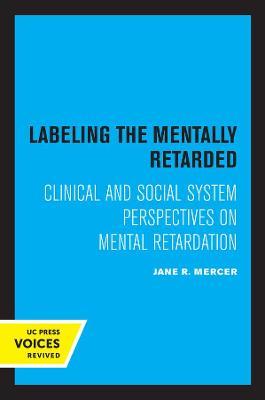Labeling the Mentally Retarded: Clinical and Social System Perspectives on Mental Retardation

Labeling the Mentally Retarded: Clinical and Social System Perspectives on Mental Retardation
This eight-year study of an American city traces the answer to the question "Who is retarded?" by analyzing the labeling process in a large number of community agencies. Data for the study are drawn from a representative sample of 7,000 persons under fifty years of age who were tested ans screened for "symptoms" of mental retardation. The author finds that that schools label more persons as mentally retarded than any other agency and share their labels more widely with others in the community. Relying on IQ test scores for diagnosis, schools place many persons with scores above 70 and with no physical disabilities in the role of retardate. The author contends that both the statistical model of "normal" and the unicultural viewpoint of educators and clinicians work to the disadvantage of the poor and the ethnic minorities. Given the opportunity, many persons demonstrate by their ability to cope with the problems in other areas of life that they are not comprehensively incompetent. The author makes serval policy recommendations. First, she suggests lowering the IQ score cutoff point used by schools in determining who shall be labeled as retarded. Second, she recommends that the clinicians use the two-dimensional definition of retardation proposed by the American Association of Mental Deficiency, subnormality in both intellectual performance and adaptive behavior. Third, she concludes that pluralistic assessment procedures must be employed to take into account cultural biases in IQ tests designed to measure cognitive skills. This title is part of UC Press's Voices Revived program, which commemorates University of California Press's mission to seek out and cultivate the brightest minds and give them voice, reach, and impact. Drawing on a backlist dating to 1893, Voices Revived makes high-quality, peer-reviewed scholarship accessible once again using print-on-demand technology. This title was originally published in 1973.
PRP: 323.68 Lei
Acesta este Pretul Recomandat de Producator. Pretul de vanzare al produsului este afisat mai jos.
291.31Lei
291.31Lei
323.68 LeiIndisponibil
Descrierea produsului
This eight-year study of an American city traces the answer to the question "Who is retarded?" by analyzing the labeling process in a large number of community agencies. Data for the study are drawn from a representative sample of 7,000 persons under fifty years of age who were tested ans screened for "symptoms" of mental retardation. The author finds that that schools label more persons as mentally retarded than any other agency and share their labels more widely with others in the community. Relying on IQ test scores for diagnosis, schools place many persons with scores above 70 and with no physical disabilities in the role of retardate. The author contends that both the statistical model of "normal" and the unicultural viewpoint of educators and clinicians work to the disadvantage of the poor and the ethnic minorities. Given the opportunity, many persons demonstrate by their ability to cope with the problems in other areas of life that they are not comprehensively incompetent. The author makes serval policy recommendations. First, she suggests lowering the IQ score cutoff point used by schools in determining who shall be labeled as retarded. Second, she recommends that the clinicians use the two-dimensional definition of retardation proposed by the American Association of Mental Deficiency, subnormality in both intellectual performance and adaptive behavior. Third, she concludes that pluralistic assessment procedures must be employed to take into account cultural biases in IQ tests designed to measure cognitive skills. This title is part of UC Press's Voices Revived program, which commemorates University of California Press's mission to seek out and cultivate the brightest minds and give them voice, reach, and impact. Drawing on a backlist dating to 1893, Voices Revived makes high-quality, peer-reviewed scholarship accessible once again using print-on-demand technology. This title was originally published in 1973.
Detaliile produsului








